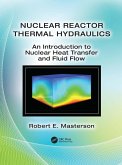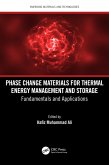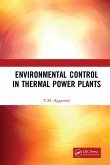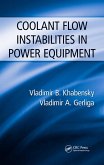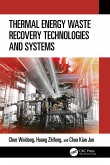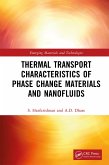162,95 €
162,95 €
inkl. MwSt.
Sofort per Download lieferbar

81 °P sammeln
162,95 €
Als Download kaufen

162,95 €
inkl. MwSt.
Sofort per Download lieferbar

81 °P sammeln
Jetzt verschenken
Alle Infos zum eBook verschenken
162,95 €
inkl. MwSt.
Sofort per Download lieferbar
Alle Infos zum eBook verschenken

81 °P sammeln
- Format: PDF
- Merkliste
- Auf die Merkliste
- Bewerten Bewerten
- Teilen
- Produkt teilen
- Produkterinnerung
- Produkterinnerung

Bitte loggen Sie sich zunächst in Ihr Kundenkonto ein oder registrieren Sie sich bei
bücher.de, um das eBook-Abo tolino select nutzen zu können.
Hier können Sie sich einloggen
Hier können Sie sich einloggen
Sie sind bereits eingeloggt. Klicken Sie auf 2. tolino select Abo, um fortzufahren.

Bitte loggen Sie sich zunächst in Ihr Kundenkonto ein oder registrieren Sie sich bei bücher.de, um das eBook-Abo tolino select nutzen zu können.
Thermal Energy Systems: Design and Analysis, Second Edition presents basic concepts for simulation and optimization, and introduces simulation and optimization techniques for system modeling.
- Geräte: PC
- mit Kopierschutz
- eBook Hilfe
- Größe: 78.69MB
Andere Kunden interessierten sich auch für
![Nuclear Reactor Thermal Hydraulics (eBook, PDF) Nuclear Reactor Thermal Hydraulics (eBook, PDF)]() Robert E. MastersonNuclear Reactor Thermal Hydraulics (eBook, PDF)214,95 €
Robert E. MastersonNuclear Reactor Thermal Hydraulics (eBook, PDF)214,95 €![Phase Change Materials for Thermal Energy Management and Storage (eBook, PDF) Phase Change Materials for Thermal Energy Management and Storage (eBook, PDF)]() Phase Change Materials for Thermal Energy Management and Storage (eBook, PDF)52,95 €
Phase Change Materials for Thermal Energy Management and Storage (eBook, PDF)52,95 €![Environmental Control in Thermal Power Plants (eBook, PDF) Environmental Control in Thermal Power Plants (eBook, PDF)]() T. M. AggarwalEnvironmental Control in Thermal Power Plants (eBook, PDF)173,95 €
T. M. AggarwalEnvironmental Control in Thermal Power Plants (eBook, PDF)173,95 €![Coolant Flow Instabilities in Power Equipment (eBook, PDF) Coolant Flow Instabilities in Power Equipment (eBook, PDF)]() Vladimir B. KhabenskyCoolant Flow Instabilities in Power Equipment (eBook, PDF)80,95 €
Vladimir B. KhabenskyCoolant Flow Instabilities in Power Equipment (eBook, PDF)80,95 €![Thermal Energy Waste Recovery Technologies and Systems (eBook, PDF) Thermal Energy Waste Recovery Technologies and Systems (eBook, PDF)]() Weidong ChenThermal Energy Waste Recovery Technologies and Systems (eBook, PDF)52,95 €
Weidong ChenThermal Energy Waste Recovery Technologies and Systems (eBook, PDF)52,95 €![Thermal Transport Characteristics of Phase Change Materials and Nanofluids (eBook, PDF) Thermal Transport Characteristics of Phase Change Materials and Nanofluids (eBook, PDF)]() S. HarikrishnanThermal Transport Characteristics of Phase Change Materials and Nanofluids (eBook, PDF)47,95 €
S. HarikrishnanThermal Transport Characteristics of Phase Change Materials and Nanofluids (eBook, PDF)47,95 €![Fundamentals of Premixed Turbulent Combustion (eBook, PDF) Fundamentals of Premixed Turbulent Combustion (eBook, PDF)]() Andrei LipatnikovFundamentals of Premixed Turbulent Combustion (eBook, PDF)75,95 €
Andrei LipatnikovFundamentals of Premixed Turbulent Combustion (eBook, PDF)75,95 €-
-
-
Thermal Energy Systems: Design and Analysis, Second Edition presents basic concepts for simulation and optimization, and introduces simulation and optimization techniques for system modeling.
Dieser Download kann aus rechtlichen Gründen nur mit Rechnungsadresse in A, B, BG, CY, CZ, D, DK, EW, E, FIN, F, GR, HR, H, IRL, I, LT, L, LR, M, NL, PL, P, R, S, SLO, SK ausgeliefert werden.
Produktdetails
- Produktdetails
- Verlag: Taylor & Francis eBooks
- Seitenzahl: 623
- Erscheinungstermin: 19. September 2018
- Englisch
- ISBN-13: 9781351736589
- Artikelnr.: 54789138
- Verlag: Taylor & Francis eBooks
- Seitenzahl: 623
- Erscheinungstermin: 19. September 2018
- Englisch
- ISBN-13: 9781351736589
- Artikelnr.: 54789138
- Herstellerkennzeichnung Die Herstellerinformationen sind derzeit nicht verfügbar.
Steven G. Penoncello earned his BS and MS in mechanical engineering from the
University of North Dakota in 1978 and 1980, respectively. He earned his PhD in mechanical
engineering from the University of Idaho in 1986. He has been a registered professional
engineer in mechanical engineering in the state of Idaho since 1993.
Dr. Penoncello has held academic positions at the University of North Dakota (instructor
from 1980-1983, assistant professor from 1986-1988, and associate professor from 1988-
1990), and the University of Idaho (visiting assistant professor from 1985-1986, associate
professor from 1990-1995, professor from 1995-2015, and professor emeritus since 2015).
He has also served in administrative positions at the University of Idaho (Mechanical
Engineering Department Chair from 1995-1999, Associate Dean for Research and
Graduate Studies in the College of Engineering from 1999-2005, and Director of the Center
for Applied Thermodynamic Studies [CATS] from 2005-2015).
Dr. Penoncello has taught undergraduate and graduate courses in thermodynamics, heat
transfer, fluid mechanics, air conditioning, solar engineering, refrigeration engineering,
internal combustion engines, energy technology, and thermal energy systems design. His
research involves the development of standard reference quality formulations for the calculation
of the thermophysical properties of fluids and fluid mixtures of scientific and
engineering interest.
Dr. Penoncello has been an active member of the American Society of Mechanical
Engineers (ASME) since 1978. He became a Life Member of the ASME in 2015. He has
served as a member of the K-7 Committee on Thermophysical Properties in the Heat
Transfer Division of the ASME from 1988-2013. He has also served as a mechanical engineering
program evaluator for the Accreditation Board on Engineering and Technology
(ABET), representing the ASME from 1999-2012.
Dr. Penoncello's background in thermal energy systems design and analysis started during
his master's research at the University of North Dakota. His master's thesis topic was
the analytical modeling and experimental verification of an innovative heat pump system
designed for cold climates. This work took a full system approach and involved the simultaneous
application of thermodynamics, fluid mechanics, and heat transfer.
In 1991, the faculty of the University of Idaho Department of Mechanical Engineering
undertook the task to critically evaluate and update their undergraduate curriculum.
During this process, a conscious decision was made to revise the curriculum to allow the
undergraduate students to have a significant design experience in several areas of the discipline
including solid mechanics and thermal sciences. This process resulted in several
new design-based courses including the senior capstone design experience (two courses),
an updated machine design course, and a new course in thermal energy systems design.
Dr. Penoncello took the lead in the development of the thermal energy systems design
course. This book represents a collection of the topics that he has taught in his course since
1992.
Dr. Penoncello has coauthored one book, two book chapters, and over 35 technical papers in the area of thermophysical properties.
University of North Dakota in 1978 and 1980, respectively. He earned his PhD in mechanical
engineering from the University of Idaho in 1986. He has been a registered professional
engineer in mechanical engineering in the state of Idaho since 1993.
Dr. Penoncello has held academic positions at the University of North Dakota (instructor
from 1980-1983, assistant professor from 1986-1988, and associate professor from 1988-
1990), and the University of Idaho (visiting assistant professor from 1985-1986, associate
professor from 1990-1995, professor from 1995-2015, and professor emeritus since 2015).
He has also served in administrative positions at the University of Idaho (Mechanical
Engineering Department Chair from 1995-1999, Associate Dean for Research and
Graduate Studies in the College of Engineering from 1999-2005, and Director of the Center
for Applied Thermodynamic Studies [CATS] from 2005-2015).
Dr. Penoncello has taught undergraduate and graduate courses in thermodynamics, heat
transfer, fluid mechanics, air conditioning, solar engineering, refrigeration engineering,
internal combustion engines, energy technology, and thermal energy systems design. His
research involves the development of standard reference quality formulations for the calculation
of the thermophysical properties of fluids and fluid mixtures of scientific and
engineering interest.
Dr. Penoncello has been an active member of the American Society of Mechanical
Engineers (ASME) since 1978. He became a Life Member of the ASME in 2015. He has
served as a member of the K-7 Committee on Thermophysical Properties in the Heat
Transfer Division of the ASME from 1988-2013. He has also served as a mechanical engineering
program evaluator for the Accreditation Board on Engineering and Technology
(ABET), representing the ASME from 1999-2012.
Dr. Penoncello's background in thermal energy systems design and analysis started during
his master's research at the University of North Dakota. His master's thesis topic was
the analytical modeling and experimental verification of an innovative heat pump system
designed for cold climates. This work took a full system approach and involved the simultaneous
application of thermodynamics, fluid mechanics, and heat transfer.
In 1991, the faculty of the University of Idaho Department of Mechanical Engineering
undertook the task to critically evaluate and update their undergraduate curriculum.
During this process, a conscious decision was made to revise the curriculum to allow the
undergraduate students to have a significant design experience in several areas of the discipline
including solid mechanics and thermal sciences. This process resulted in several
new design-based courses including the senior capstone design experience (two courses),
an updated machine design course, and a new course in thermal energy systems design.
Dr. Penoncello took the lead in the development of the thermal energy systems design
course. This book represents a collection of the topics that he has taught in his course since
1992.
Dr. Penoncello has coauthored one book, two book chapters, and over 35 technical papers in the area of thermophysical properties.
Introduction to Thermal Energy Design. Economics of Thermal Energy Systems.
Review of Fluid and Thermal Concepts Found in Thermal Energy Systems.
Properties of Working Fluids in Thermal Energy Systems. Analysis of Thermal
Energy Systems. Fluid Transport in Thermal Energy Systems. Energy Transport
in Thermal Energy Systems. Optimization of Thermal Energy Systems.
Appendix. Index.
Review of Fluid and Thermal Concepts Found in Thermal Energy Systems.
Properties of Working Fluids in Thermal Energy Systems. Analysis of Thermal
Energy Systems. Fluid Transport in Thermal Energy Systems. Energy Transport
in Thermal Energy Systems. Optimization of Thermal Energy Systems.
Appendix. Index.
Introduction to Thermal Energy Design. Economics of Thermal Energy Systems.
Review of Fluid and Thermal Concepts Found in Thermal Energy Systems.
Properties of Working Fluids in Thermal Energy Systems. Analysis of Thermal
Energy Systems. Fluid Transport in Thermal Energy Systems. Energy Transport
in Thermal Energy Systems. Optimization of Thermal Energy Systems.
Appendix. Index.
Review of Fluid and Thermal Concepts Found in Thermal Energy Systems.
Properties of Working Fluids in Thermal Energy Systems. Analysis of Thermal
Energy Systems. Fluid Transport in Thermal Energy Systems. Energy Transport
in Thermal Energy Systems. Optimization of Thermal Energy Systems.
Appendix. Index.

